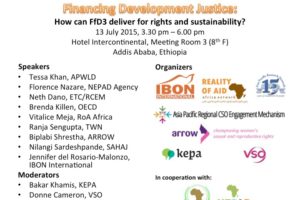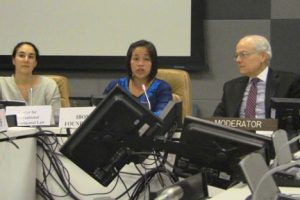The United Nation’s Economic and Social Commission for Asia and the Pacific’s (ESCAP) 2020 progress report on the Sustainable Development Goals (SDGs) admitted that the region is going in the wrong direction in terms of achieving the goals on sustainable consumption and production (Goal 12) and climate action (Goal 13). According to ESCAP, “renewable energy has dropped to 16 per cent, one of the lowest rates globally. The region also emits half of the world’s total greenhouse gas – a number which has doubled since 2000.”[1] The UN Food and Agriculture Organization in 2019 released the report titled Forest Futures wherein it was emphasized that “forests unaffected by human activities now reduced to 140 million hectares or 19 per cent of the total forest area — lower than the global average of 32 per cent.[2]” Although forests in the region actually increased with an additional 17.6 million hectares since the 1990s, most of these are planted with single-tree species which are vulnerable to climate change, forest fires, and forest diseases, and also do not contribute to reviving the biodiversity that was lost along with the primary forests.
Liberalization and deregulation policies imposed by the IMF-WB, WTO and other trade and investment agreements in the region facilitated the expansion of monocrop plantations, chemical-based agriculture, investments in giant extractives and dirty energy projects, and off-shoring of pollutive and hazardous production processes. These continue to fuel the engine that drives biodiversity loss to the point of mass extinction, as well as resource grabbing from communities, farmers, indigenous peoples, and fisher folk.
However, this is unsurprising since the unsustainable production and consumption system based on neoliberal globalization is still intact and in full swing. Liberalization and deregulation policies imposed by the International Monetary Fund-World Bank (IMF-WB), World Trade Organization (WTO), and other trade and investment agreements in the region facilitated the expansion of monocrop plantations, chemical-based agriculture, investments in giant extractives and dirty energy projects, and off-shoring of pollutive and hazardous production processes. These continue to fuel the engine that drives biodiversity loss to the point of mass extinction, as well as resource grabbing from communities, farmers, indigenous peoples, and fisher folk. In the island of Borneo for example, industrial plantations converted from 2000 to 2017 around 2.08 million hectares of forests[3], an area more than three times larger than Brunei and 18 times larger than Hong Kong. The World Bank helped this massive destruction of natural habitats and displacement of local communities, including indigenous peoples and farmers, by investing USD 500.6 million in palm oil commitments in Indonesia from 1965 to 2014.[4]
This unsustainable production and consumption system is the same system that is worsening inequality in the region. It allows high-net-worth individuals who are less than 1% of Asia Pacific’s population, to accumulate a combined wealth in 2019 (USD 20.6 trillion)[5] that is almost 54 times more than the combined GDPs of Asia Pacific’s Least Developed Countries (LDCs) in 2018. On the other hand, 1.3 billion, or 68.2% of the region’s working people are in the informal sector[6] where often, there is no social security, no job security, workers are not paid living wages and are made to work in hazardous conditions. These working conditions, along with privatized public services such as housing and healthcare, make working people and other marginalized sectors more vulnerable to crises such as the COVID-19 pandemic.
Unfortunately, these drivers of unsustainability and inequality will gain more momentum when the regional trade deals, the Regional Comprehensive Economic Partnership (RCEP) and the Comprehensive and Progressive Agreement for Trans-Pacific Partnership (CPTPP) are enforced. Both trade agreements will facilitate more investments in resource extraction, increase privatization of services, limit access to medicines by extending pharmaceutical monopolies, restrict farmers from exchanging seeds, and allow corporations to sue governments and be awarded taxpayer money.
Corporate resource grabbers have taken advantage of the lockdowns to continue their operations, further dispossessing farmers and indigenous peoples. Spaces for democratic participation continue to shrink and disappear as people and their organizations are limited to online means involvement and protest, while some governments use this opportunity to further crackdown on activists and rights defenders.
The COVID-19 pandemic not only further exposed, but also exacerbated the existing inequalities in the region. Corporate resource grabbers have taken advantage of the lockdowns to continue their operations, further dispossessing farmers and indigenous peoples in the Philippines, India, and Indonesia. Along with weak public health systems, lack of social security, job losses, and hunger, the poor are made to suffer from draconian and militarized measures that are supposed to help curb the spread of the virus. Spaces for democratic participation continue to shrink and disappear as people and their organizations are limited to online means involvement and protest, while some governments use this opportunity to further crackdown on activists and rights defenders. The recent 7th Asia Pacific Forum on Sustainable Development (APFSD) has also shown the limitations of online processes and platforms in genuinely democratizing participation. Whatever the medium used, genuine democratization will not be achieved as long as the people and their organizations are the least priority in being heard.
This is why when we talk about transformation towards sustainable consumption and production, the issues that need to be addressed cease to be confined within the realms of resource efficiency, technology, and controlling waste. Technological solutions are not real solutions if they allow big corporations and the elite to control resources, including data, at the expense of the people’s health, job security, their well-being and the environment. A people-powered sustainable consumption and production framework which protects people’s rights and sovereignty, supports self-sufficiency and community and social innovations, and exacts accountability from duty bearers, will enable economies towards genuine SCP.
A people-powered sustainable consumption and production framework which protects people’s rights and sovereignty, supports self-sufficiency and community and social innovations, and exacts accountability from duty bearers, will enable economies towards genuine SCP.
SCP must include upholding people’s rights – their right to living wages, safe working conditions, healthcare and social services, their right to safe, healthy, and adequate food, healthy environments, their control over resources. People’s rights, including their right to participate in governance and shape economic and social policies, must be at the center of sustainable consumption and production. This means, in order to transform societies to genuine sustainable consumption and production, measures such as reorienting the unequal global financial and trade architecture towards people-centered and redistributive rules. Unequal, environmentally destructive, and human rights violating trade and investment deals must be discontinued. Governments must look towards crafting trade deals that will allow building local sustainable economies, including the local sustainable agriculture food systems. Onerous debt and excessive military spending should be cancelled in order to free up resources for spending towards sustainable development, including grassroots-led initiatives on sustainable consumption and production and climate adaptation and mitigation. Corporations must be taxed accordingly and be held to the strictest regulations in order to ensure that they comply with human rights and environmental standards.
Defining and shaping the new normal after the pandemic must not be left to governments and corporations. The people and their organizations must be empowered to substantively shape economic and social plans that affect them and to hold duty bearers such as states and corporations accountable. The new normal should neither mean going back to nor further entrenching the old unsustainable system that have brought numerous crises, including this pandemic. The new normal should be a world where the planetary boundaries are respected, and people’s rights are upheld and protected.###
[1] ESCAP. (2020, March 25). Striking Lack Of Progress On Environmental SDGs In Asia-Pacific, Reveals New UN Report. Retrieved from https://www.unescap.org/news/striking-lack-progress-environmental-sdgs-asia-pacific-reveals-new-un-report
[2] Arkin, F. (2019, June 24). Asia Pacific old-growth forest decline fastest globally. SciDevNet. Retrieved from https://www.scidev.net/asia-pacific/forestry/news/asia-pacific-old-growth-forest-decline-fastest-globally.html.
[3] Gaveau, D. (2019, February 14). Satellites check oil palm expansion in Borneo. SciDevNet. Retrieved from https://www.scidev.net/asia-pacific/conservation/opinion/satellites-check-oil-palm-expansion-in-borneo.html
[4] Sonkin, F., Mousseau, F., Mittal, M., & Fraser, E. (2018). Indonesia: The World Bank’s Failed East Asian Miracle. Retrieved from https://www.oaklandinstitute.org/sites/oaklandinstitute.org/files/indonesia-world-bank-failed-east-asian-miracle.pdf
[5] Capgemini. (2019). World Wealth Report 2019. Retrieved from https://www.capgemini.com/es-es/wp-content/uploads/sites/16/2019/07/World-Wealth-Report-WWR-2019.pdf
[6] ILO. (2018, May 2). More than 68 per cent of the employed population in Asia-Pacific are in the informal economy. Retrieved from https://www.ilo.org/asia/media-centre/news/WCMS_627585/lang–en/index.htm


